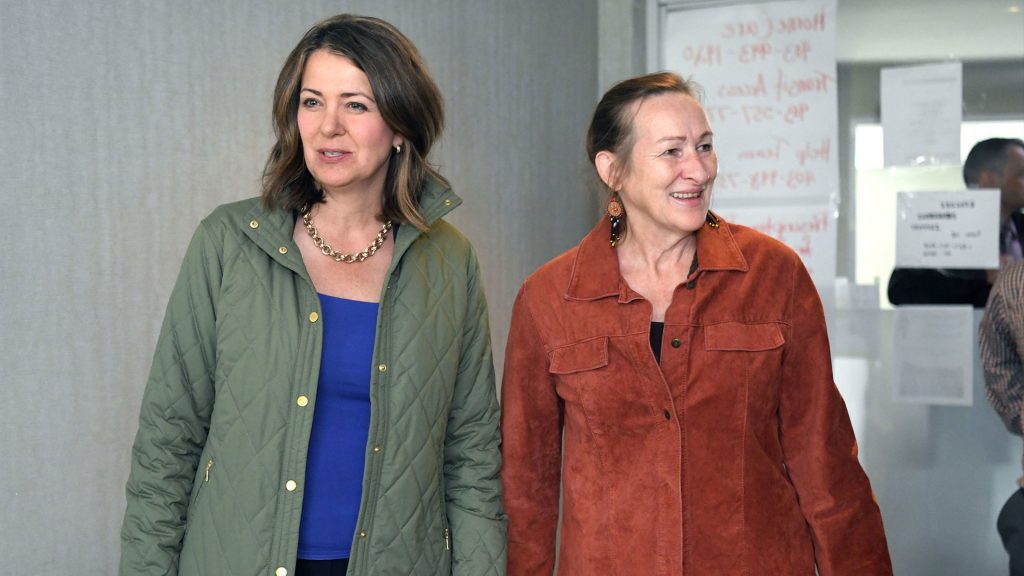
Premier Danielle Smith and Premier Caroline Cochrane bring in coffee and doughnuts to wildfire evacuees. Photo: Supplied/Alberta Government
The premier of the Northwest Territories says she is angry the wildfire-ravaged region doesn’t have the same services as southern provinces and called on Canadians to pressure Ottawa to make improvements.
Premier Caroline Cochrane told a news conference in Calgary Friday that she’s spent years calling for the federal government to develop roads and communication technologies needed to keep people safe as the territory sees more fires and other impacts of climate change.
“We have been asking for the same infrastructure, roads, communication, that people in Canada take for granted for decades,” Cochrane said after touring a Calgary reception centre for wildfire evacuees.
“When (the community of) Hay River started on fire, people were driving through our one road out with fire on both sides … our communications went down and we had no redundancy.”

An estimated 30,000 people were ordered to leave the territory last week amid 200 wildfires burning across the N.W.T.
“Now I am angry… I need every single Canadian to say it is not OK that the territories live like Third World countries … that we do not have the same services as everyone else,” Cochrane said as Alberta premier and enthusiastic critic of the federal government Danielle Smith nodded in agreement.
Unlike the provinces, the territorial government runs a “consensus-style government” where elected officials are not members of a political party and party membership is not recognized.
Yet, similar to the provinces, the territory relies on an influx of money from the federal government to assist with major infrastructure projects.
Tens of thousands of people from the N.W.T. have been forced from their homes by wildfires, with more than 21,500 seeking refuge in Alberta.
Read more:
N.W.T. wildfires disrupt phone, internet services as evacuee anxiety mounts
The impact of wildfires on evacuees: ‘You could taste the smoke’
Alberta’s healthcare system absorbed patients from the North who needed medical care. And, it made room for 85 inmates in its prisons.
Cochrane told reporters she is eternally grateful for the kindness and support shown by Albertans.
“Many of the people in the North have never left the North and are not familiar with big cities. I know it is a struggle,” she said.
Smith thanked Albertans for opening their homes to the evacuees.
“I would like to thank all those who assisted in providing housing, meals, water, gasoline and other supports during an incredibly vulnerable time,” she said.
In an update, the territorial government said its capital of Yellowknife was likely safe from fire for the next 72 hours.
No significant advance was seen Thursday, officials said, and the fire remains about 15 kilometres outside city limits.
The Northwest Territories legislature is set to reconvene for one day on Monday to deal with the fallout from the fire, including distributing financial aid to residents.
Both premiers were asked what steps they would be taking to mitigate climate change and other natural disasters moving forward.
Smith talked about the importance of creating fire breaks and her government’s goal to be net-zero carbon emissions by 2050.
Cochrane said the North is already experiencing climate change issues.
“I can tell you we have been facing climate [change] issues for a while,” she said. “Our permafrost is melting. The Artic sea is melting.
“These fires I would love to say it is a one-time event but I can’t guarantee it.”










